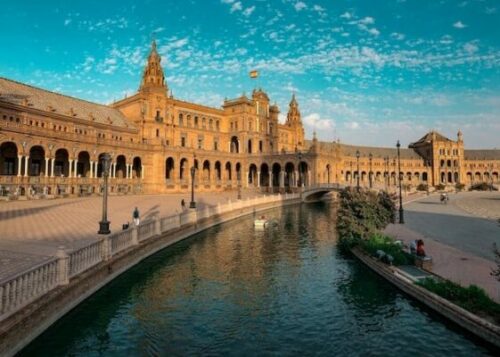Living in Spain as an expat is an intriguing and enriching experience due to its relaxing lifestyle, lovely weather, delicious cuisine, and rich culture. Spanish people are typically polite and hospitable, making it simple to feel at ease. With world-renowned museums and historical sites nationwide, the country’s history and architecture provide a captivating backdrop to daily life.
You can find coastal communities with beautiful beaches along the Mediterranean Sea. While Castilian Spanish is the official language and learning Spanish will make day-to-day life easier, most expats find that a rudimentary understanding of the language is adequate.
The Spanish lifestyle is further appealing due to the cost of living in Spain, which is typically cheaper than other European nations and much cheaper than the United States. However, for the most part, your lifestyle and where you live in Spain will determine your living costs.
In this article, you’ll learn about what it’s like to live in Spain, including insights into the cost of living, the healthcare system, and the overall expat experience. We’ll delve into the cultural nuances and practicalities of day-to-day Spanish life, providing an understanding of what to expect as an expat in this vibrant and diverse country. Additionally, we’ll break down the Spain Golden Visa program and other viable routes expats have used to reside in Spain legally.
Why live in Spain?

Spain is also a fantastic destination for outdoor enthusiasts, and its varied topography facilitates a wide range of activities to pursue. You can go skiing in the Sierra Nevada, snorkeling in the Canary Islands, and rock climbing or cave dwelling in Andalusia.
The healthcare system is of excellent quality and is universally accessible to all citizens, including foreign residents. If you’re an expat arriving from the US, you’ll find that private healthcare insurance is significantly cheaper for a comparable standard of service.
The Spanish lifestyle
The benefit of living in Spain that most expats appreciate is the option to live at a slower pace, particularly for those entering their golden years. Most foreigners living in Spain prioritize living life to the fullest, allocating significant time to relax and socialize with locals and expat friends.
This is largely influenced by the commonality of seeing Spaniards eat lengthy meals and socialize with friends and family. The change of pace may take some getting used to for individuals accustomed to a fast-paced life in big cities, but many find it to be a welcome adjustment.
Furthermore, Spain has an excellent public transportation infrastructure, simplifying traveling without a car. Its city centers and rural areas are well connected. Spain’s diverse transportation network, encompassing high-speed trains, regional buses, and domestic flights, provides an ideal business environment for many entrepreneurs.
The country is home to multiple international airports with several low-cost airlines providing cheap travel from Spain to desirable European locations. This is in addition to direct routes to numerous airports in Asia, Africa, and South America.
Finally, Spain hosts diverse expat communities, with individuals from all over the world making Spain their home. While many countries have recently experienced increased foreign residents through immigrant investor programs, many European citizens, especially from France, Germany, and the UK, have favored Spain as a retirement destination for decades.
This allows new expats to meet new people and make expat friends, learn about various cultures and experiences of expats with years of knowledge of the Spanish way of life. Moving to Spain as an expat can be a rewarding and enlightening experience for anyone prepared to embrace its culture and
A Practical Guide to Living in Spain
If you wish to start a new life living in Spain as an American expat or, for that matter, an expat from any other country, you should be aware of the practical features of the Spanish way of life. Here is a helpful guide on adjusting to living in Spain:
Language: If you’re already considering Spain as your new home, you’ll know that Castilian Spanish is the country’s official language, and while many Spaniards speak English, having a basic understanding of the language will make the transition to life much easier.
You can gradually learn Spanish by taking language lessons or using language-learning apps to improve your skills. Learning common phrases and words used daily will reduce the language barrier. Spanish people are also receptive to foreigners who take the time to learn their language.
Climate: Although Spain is famed for its bright 
Nevertheless, the climate varies depending on the location, and regions like Galicia and Asturias have much cooler climates with manageable summer temperatures.
Cost of living: The cost of living in Spain is an appealing aspect of Spanish life for many Americans. While living costs vary depending on where you live, you can expect to save money when coming from the United States and other Western European Countries.
As a Spanish resident, you can expect to save money on rent, utilities, groceries, and eating out, which will allow you to put savings towards investments or retirement.
Culture: Spanish culture places considerable emphasis on family, cuisine, and leisure time. Whether you reside in a small town or live a big city life, prepare to enjoy Spanish cuisine with friends and family and participate in cultural activities such as festivals and celebrations. As you may have heard, the siesta is a fundamental part of its culture.
For those accustomed to a day of constant activity and accessible services, Spanish culture embraces a midday break for rest and rejuvenation. During this time, many businesses, especially in smaller towns and cities, close their doors temporarily, allowing locals and visitors alike to unwind and recharge. This practice reflects the Spanish value of work-life balance and a more relaxed approach to daily routines.
Healthcare: The SNS (Sistema Nacional de Salud) is Spain’s national healthcare service funded through taxes, which is available for all citizens and legal residents who make social security contributions. This benefits retiring expats who wish to reduce their healthcare costs. Spanish residents can see doctors for free, and prescriptions are heavily subsidized.
Moreover, expats who value prompt treatment and advanced healthcare services can opt for reasonably priced private health insurance in Spain, with monthly premiums ranging from €50 to €200.
Transportation: Spain has a well-developed public transportation system that includes buses, trains, and metro lines. As with most other European countries and those worldwide, there are more options for transportation in big Spanish cities compared to rural towns.

Banking: Spain has a modern banking system, with several multinational banks serving retail customers, private companies, and international corporations. A local bank account is vital to ensure convenience in your day-to-day life in Spain.
Taxes: Taxes are one of the few things everyone has to deal with, and Spain is no different. When moving abroad to a foreign country, many expats face the predicament of double taxation, essentially meaning the obligation to pay taxes to two tax jurisdictions.
Holders of visas such as the Spain Non-lucrative Visa will be liable to pay Spanish taxes if they live in the country for more than half the year, even though the income they earn is from overseas. Verify if your country has a bilateral tax treaty with Spain, and explore any tax exemptions and deductions applicable to residents residing abroad.
Expat Life in Spain: Living in Spain Overview
Expat origins
Expats worldwide go to Spain for various reasons. Madrid, Barcelona, Valencia, Malaga, and Alicante are among Spain’s most popular expat destinations, with arrivals from multiple countries, cultures, and origins. Foreign residents also range from retirees and families to digital nomads and students.
The Spanish way of life
For expats arriving from Latin American countries, the absence of a language barrier and the presence of cultural similarities facilitates an easier path to assimilating to the Spaniards’ way of life. Other expats may need to adjust to social habits and expectations changes since Spaniards have a distinct cultural identity. The Spanish, for example, eat later in the day than other non-Latin cultures.
Spain’s mild climate and laid-back lifestyle can be very popular with expats. Spaniards place a significant priority on having fun and taking time to relax and mingle, which may be a refreshing change for those accustomed to a faster pace of life.
Saving money when moving to Spain
Apart from the lifestyle and cultural perks, living in Spain as an expat may also be cost-effective. Spain’s cost of living is generally cheaper than many other European nations, mainly Western. For American expats, the difference is easily noticeable in housing prices, rent, and the cost of groceries, dining out, and public transportation.
While housing expenses and property prices in Spain will vary based on location and accommodation type, moving to Spain typically results in lower living expenses for most expats.
The Spanish working life
Anyone planning to move to Spain for work should know that the job market is highly competitive, particularly in specific industries like information technology. One contributing factor to the low cost of living is the comparatively fewer opportunities available to young professionals in Spain than in many other developed nations.
Additionally, many occupations need fluency in Spanish, although there are opportunities for individuals who speak English or other languages, notably in the tourist business.
The drawbacks of the expat experience in Spain
Living in Spain as an expat may not always be so positive. For example, some issues you may encounter could include bureaucracy, which is often slow and lacks proactiveness concerning foreigners, language hurdles, and finding work.

Still, most expats believe that the benefits far outweigh the drawbacks. Overall, the expat community in Spain is varied and inviting, offering an excellent opportunity to meet people from all over the world while enjoying everything the country has to offer.
Despite the difficulties, many expats in Spain have an incredible feeling of community among fellow expats and natives. There are several possibilities to interact with people and develop a support network, ranging from language exchange groups to cultural events.
Living as an expat in Spain can be a wonderful and enlightening experience. It’s vital to do your homework and be prepared for the obstacles that come with living in a different country, but Spain can be a lovely location to call home if you have an open mind and are eager to welcome new experiences.
Pros and Cons of Living in Spain
While living abroad in Spain can be a dream come true for many expatriates compared to living in other regions, considering the benefits and negatives can help make an informed choice. For instance, as a counter to one downside of Spain’s high unemployment rate, there is an excellent, well-managed medical system.
Spain is a favorite destination for expats worldwide due to its long summers, cool winters, beautiful beaches, rich ancient culture, and laid-back lifestyle. But, like with any nation, living in Spain as an American has advantages and disadvantages. Let’s look at some of the primary benefits and drawbacks of living in Spain to help you decide whether it’s the perfect place for you.
Pros of Living in Spain
Desirable climate: With a calm Mediterranean climate, Spain offers plenty of sunshine and experiences less average rainfall than European countries like Germany, France, and the UK. This makes it a prime destination for outdoor enthusiasts.
Laid-back lifestyle: Spanish people are recognized for their peaceful and laid-back lifestyle, which can be a nice change for individuals arriving from a fast-paced and demanding atmosphere. The lifestyle in Spain plays a significant role in ranking as one of the world’s healthiest countries.
Rich culture: Spain’s rich cultural history has littered the country with gorgeous buildings, world-class museums, and a thriving arts scene, forming a collage of cultural treasures that captivate visitors from around the globe. From the awe-inspiring architecture of Gaudi in Barcelona to the magnificent Alhambra in Granada, each city and region boasts its unique architectural marvels.
Renowned gastronomy: Spanish cuisine needs no introduction, as it is famous the world over for its rich and diverse flavors. From the iconic paella of Valencia to the delicious tapas found throughout the country, Spain offers a culinary experience like no other. Fresh, locally sourced ingredients in Spanish food are a hallmark of Spanish cooking, resulting in dishes that burst with flavor and authenticity.
Low cost of living: Unlike many other Western European nations, many Northern and Southern Spain regions offer affordable living costs, particularly for expats earning a foreign income through investments or a pension. Even in major cities, living costs are comparatively cheaper than in big cities like New York City, Paris, Munich, and London.
Access to healthcare: Residents and citizens of Spain have free access to the country’s high-quality public healthcare system, including subsidized prescriptions and medication. Additionally, expats can buy private health insurance with affordable premiums.
Gorgeous natural landscapes: Spain has some of Europe’s most attractive natural landscapes, from the lovely beaches of the Costa del Sol on the Mediterranean Sea to the rocky Pyrenees of the Iberian Peninsula. This also offers diverse living options among the varying lifestyle preferences of expats.
Cons of Living in Spain
Language barrier: Living in Spain can be difficult for people who do not speak Spanish fluently. English is not commonly spoken, particularly in rural areas, making simple things like grocery shopping or doctor visits more challenging than if you had a basic grasp of Spanish.
Bureaucracy: Navigating Spanish bureaucracy can be more hassle than in many developed countries. A lack of conciseness in many procedures complicates tasks such as dealing with banks or enrolling in healthcare programs.
High unemployment: Spain has a relatively high unemployment rate, particularly among young people, which may present difficulties in finding jobs for foreigners looking to move to Spain for work.
Nightlife: While Spain is known for its vibrant nightlife, this might be a detriment for individuals who prefer peace and quiet. Bars and clubs in many cities stay open late into the night, which can be noisy and unpleasant to people nearby.
Crowds in high season: Spain is a victim of its own success, experiencing a large influx of tourists throughout the year, especially during summer. This can result in congestion and lengthy queues at major tourist attractions, as well as higher pricing for lodging and other expenses in desirable locations.
Siesta culture: While the siesta culture is a positive aspect of Spanish society, it may also be a disadvantage for people not accustomed to it. Many companies and stores close for several hours in the afternoon, which is inconvenient for individuals who prefer to shop or do errands throughout the day.
Political instability: Spain is generally regarded as one of the safest countries worldwide. However, there have been instances of political instability in recent years, mainly related to the Catalan independence movement. While this is unlikely to affect the daily lives of most foreigners, it might cause uncertainty and uneasiness for those living in the Catalan region.
Despite the cons, expats who live in Spain report that the benefits of living there far outweigh the disadvantages and that living in Spain is very fulfilling.
Spanish Cost of Living
The overall cost of living is typically considered cheaper than many other Western European nations, notably housing, food, and healthcare. According to Numbeo, a single person’s average cost of living in Spain is almost half the average in the US.
Even large metropolitan internationally famous areas such as Madrid and Barcelona offer cheaper living conditions than many major cities in Europe. A monthly income of around $1,500 to $2,000 can provide a good standard of living in Spain.
Examples of Living Expenses in Spain

For cheaper cities like Seville, expats can expect to pay an average monthly rent of $620 for a one-bedroom apartment.
Food: A simple lunch in an inexpensive restaurant in Spain costs about $13, compared to $20 in the US. A three-course meal in a mid-range restaurant costs about $24 per person. A week’s worth of groceries for two individuals costs roughly $60, depending on where they live.
Healthcare: Residents and citizens of Spain have access to a free public healthcare system. Private healthcare from some of Spain’s biggest healthcare providers, such as Allianz Care and Cigna Global, costs around €50 to €200 per month.
Transport: Public transport in a city like Madrid is affordable for a large metropolitan city. An average monthly pass costs $45 compared to $130 in New York City and $200 in London.
Property Buying in Spain
Purchasing property in Spain is typically seen as a simple procedure for expats, and there are no limitations on foreigners buying Spanish houses. In truth, Spain is a popular property investment destination, particularly among British and Northern European nationals, as real estate prices are much lower on average, and a property purchase is a viable route to acquire the country’s Golden Visa.
Spain witnessed a substantial real estate market downfall in the 2008 to 2009 financial year. However, it has steadily risen since then, with a growing number of buyers entering the Spanish property market.
According to Statista, the below prices per square meter reflect the average cost of real estate in popular Spanish regions:
- Balearic Islands: €3,353 /m2
- Madrid: €2,967 /m2
- Catalonia: €2,317 /m2
- Basque Country: €2,706 /m2
- Andalusia: €1,768 /m2
- Valencia region: €1,487 /m2
Political instability: In recent years, Spain has witnessed political instability, notably with the Catalan independence movement. While this is unlikely to affect most foreigners’ daily lives, it might cause uncertainty and uneasiness for those who live in the nation.
Despite the cons, expats who live in Spain report that the benefits of living here far outweigh the disadvantages and that living in Spain is very fulfilling and gratifying.
How Can Global Citizen Solutions Help You?
Global Citizen Solutions is a boutique migration consultancy firm with years of experience delivering bespoke residence and citizenship by investment solutions for international families. With offices worldwide and an experienced, hands-on team, we have helped hundreds of clients worldwide acquire citizenship, residence visas, or homes while diversifying their portfolios with robust investments.
We guide you from start to finish, taking you beyond your citizenship or residency by investment application.

Why Foreigners Find it Easy to Buy Property in Spain
Well-established property market: Spain has a well-established real estate market, and many skilled experts can help with the purchase process, such as real estate brokers, attorneys, and notaries.
Property rules are clear: Spain has established property laws to protect buyers and sellers. The Spanish government tightly regulates the purchasing process and procedures controlling the transfer of ownership.
Low property prices: Generally, property prices in Spain are lower than in many other Western European nations, particularly in rural spaces and smaller towns. This makes it an attractive location for people wishing to invest in real estate, and foreigners often find they have more liquidity to allocate.
Relatively low taxes: Compared to many other nations, the taxes involved with purchasing property in Spain are comparatively cheap, in addition to tax benefits available to individuals investing in specific regions.
It is essential to highlight that buying property in Spain includes certain dangers and obstacles, particularly for individuals new to buying property overseas. Global Citizen Solutions has a team of migration experts collaborating with reputable real estate agents in Spain. We can help you acquire Spanish real estate while qualifying for the Golden Visa program to obtain residency.
Explore Europe From Spain

- Spain is centrally located in Southwestern Europe, making it the ideal point of departure to explore Europe and popular tourist destinations in other European nations.
- The country has a well-developed transportation network, which includes trains, buses, and domestic and international airports. The high-speed train network, in particular, allows for speedy and comfortable travel to other cities in Spain and adjacent countries.
- Many low-cost airlines, including Ryanair, EasyJet, and Vueling, operate inside Europe, providing low-cost flights from Spanish airports to locations around Europe.
- Spain is a member of the Schengen Agreement, providing unrestricted movement between member states without presenting documents.
Europe is a diverse and exciting continent to travel to, with many different countries and cultures in close proximity to discover. Situated at the heart of Europe, Spain provides straightforward access to countries like Portugal, France, Italy, and beyond.
The Best Countries to Visit from Spain
Portugal: Spain’s Western neighbor is known for its dynamic cities like Lisbon, stunning beaches, and wine regions like the Douro Valley. Its proximity makes it easily accessible with convenient transportation options, including trains, buses, and short flights.
France: Another of Spain’s border countries, France, is famed for its gorgeous architecture, world-class cuisine, and famous attractions such as the Eiffel Tower and the Louvre. Like Portugal, visiting France is straightforward, with multiple transportation options.
Italy: Italy is a must-see destination for many tourists. Its cuisine is highly regarded, and it is one of Europe’s most historically rich countries. You can land in Rome from Barcelona in less than two hours, and several airlines offer convenient flights between the many cities in both countries.
Germany: Oktoberfest has expanded into countries worldwide, but there’s nothing like authentic German beer and bratwurst. Germany is an excellent vacation for history and culture buffs. It’s only a two-hour journey from Barcelona to the culturally dynamic city of Berlin.
Morocco: Spain is the closest European country to the African continent, and a ferry ride from Tarifa to Tangier, Morocco, takes just one hour. In Morocco, you’ll experience a drastically different way of life and culture, immersing yourself in vibrant markets, bustling medinas, and rich traditions of this North African gem.
Healthcare for Expats in Spain
The healthcare system in Spain is well-regarded, and expats residing in Spain may take advantage of the public healthcare system, which offers free or low-cost treatment to locals. Here’s everything you need to know about Spain’s healthcare system for expats.
The National Health System (Sistema Nacional de Salud or SNS) is Spain’s public healthcare system, offering inhabitants free or low-cost healthcare. Expats who are legal residents and obtain a social security number are entitled to free healthcare.
Spain’s healthcare system is regarded as one of the best in Europe, with excellent care standards and access to cutting-edge medical technologies. Many physicians and medical workers in Spain speak English, which might be comforting for those who don’t speak Spanish. Prescription pharmaceuticals are accessible in Spanish pharmacies, with low prices due to government subsidization.
Private healthcare
Expats who do not qualify for state healthcare or prefer private health insurance have various private healthcare providers to choose from. Private healthcare in Spain is of high quality and cheaper than in other countries like the US and Canada. For those working in Spain, certain Spanish firms will provide private health insurance to employees as part of benefits packages.
Private health insurance ranges from €50 to €200 per month, depending on age and pre-existing medical conditions.
Generally, foreigners living in Spain commend the Spanish healthcare system. And cheap private healthcare further adds to the country’s appeal.
The Best Places to Live in Spain

Barcelona: Barcelona is a cosmopolitan city with modern and old buildings, delicious gastronomy, and a vibrant arts and cultural scene. The city is well-known for its beaches, world-renowned attractions, including the Sagrada Familia and Park Güell, and lively nightlife. It is also an international corporate center with a vibrant startup sector.
Madrid: The capital of Spain, Madrid, provides a blend of historic and modern living. It features a thriving culinary scene and world-class museums like the Prado and Reina Sofia. It’s a global city offering many options for Spanish cuisine as well as international food. Madrid is also a commercial and banking center, making it an ideal location if you’re a foreign worker or wish to start your own business.
Valencia: Valencia is a picturesque seaside city on Spain’s east coast, providing a high quality of life for expats. It is famed for its spectacular architecture, including the City of Arts and Sciences, and its famous gastronomy, such as the legendary dish paella. Valencia also has terrific weather, with 300 days of sunlight on average every year.
Seville: Seville is a historic city in southern Spain that provides expats with a varied cultural experience. It is famous for its beautiful architecture, such as the Alcazar and the Cathedral of Seville, as well as flamenco dance and music. An appealing aspect of Seville is that it’s significantly cheaper to buy or rent property than in big cities like Barcelona and Madrid.
With a €500,000 investment in real estate in Seville, you could own a three-bedroom penthouse or a four-bedroom villa with a pool. This investment also qualifies you for the Spain Golden Visa to obtain a Spanish residence permit.
These locations provide a high standard of living for expats, with a diverse mix of culture, leisure, and economic prospects. But, depending on individual interests, there are many more fantastic places to live in Spain, so it’s necessary to research and visit other areas before deciding.
How to Obtain Spanish Residency
As a member of the European Union, Spain provides several standardized routes to gain a residence permit, such as a student visa and the EU Blue Card, provided you fulfill the visa’s criteria. Two notable options that are increasingly popular among expats are the Spain Golden Visa and the Non-lucrative Visa.
Golden Visa
The Golden Visa program is an immigrant investment program that allows individuals to gain residency by making a financial investment in the Spanish economy. This involves investing a minimum of €500,000, and investment options include real estate purchases, bank deposits, or starting a business that creates jobs for Spanish citizens. The visa is initially valid for two years and renewable continuously every three years.
Non-lucrative Visa
The Spain Non-Lucrative Visa is suitable for individuals with passive incomes, particularly retirees, who have the financial means to support themselves while living in Spain without engaging in any work or professional activity. Applicants must demonstrate they earn a passive income from foreign sources of at least €2,400 per month or an annual income of about €29,000.
After successful renewal and five years of residency, both visas offer a pathway to permanent residency. With an additional five years of residency, individuals can qualify for Spanish citizenship, provided they fulfill standard criteria such as no extended stays outside the country, the ability to speak Spanish, and an understanding of Spanish customs and traditions.
The Infamous "August Shut Down" in Spain
The “August exodus” or “August closure” (cierre de Agosto) refers to the typical holiday time in Spain when many companies and government offices shut down for a few weeks during August. This is because August is generally Spain’s warmest month, and many people use this opportunity to travel or spend time with their relatives.
Numerous stores, restaurants, and other businesses may close for several weeks during this period, especially in smaller towns and villages. On the other hand, tourist destinations and larger cities still offer plenty of alternatives for visitors to fulfill the increased tourist demand.
Additionally, public transit may operate on a reduced schedule during the August exodus, but critical services such as hospitals and emergency services remain open.
For expats residing in Spain, the August exodus might be an opportunity to take a vacation or travel inside or outside the country. However, preparing and making any required plans is essential, such as storing supplies before companies close or reserving flights and lodgings ahead of time.
Spain: A Mix of Ancient and Contemporary

Spain is also a modern and progressive country that has embraced new trends and ways of living. This is reflected in its cities, which have sleek and modern architecture, world-class museums and galleries, and a thriving culinary and nightlife scene. Spain is also recognized for its cutting-edge businesses, such as technology companies, renewable energy, and design.
Another factor that contributes to Spain’s blend of old and modern is its people. Spaniards are recognized for being friendly, inviting, and family-oriented, and their traditional beliefs and practices reflect this. Despite the predominantly Catholic faith of Spaniards, their progressive and inclusive outlook has propelled Spain to be recognized as one of the most LGBTQ-friendly countries globally. Notably, Madrid hosts one of the world’s largest gay pride events.
Spain’s lifestyle strikes a balance between heritage and modernity. While many Spanish prefer a slower pace of life and enjoy afternoon siestas, the country has also welcomed contemporary amenities and innovations. Spain, for example, has a well-developed transportation infrastructure, from high-speed trains and electric buses to modern airports and ferries.
Spain’s combination of historical and contemporary components offers expats a unique and dynamic atmosphere to explore and enjoy. The country has something for everyone, whether you are interested in history and culture, innovative industries, or a balanced and joyful lifestyle.
The Bottom Line
Choosing to live as an expat in Spain is a significant decision that can lead to many rewards and lifestyle changes. Spain provides a distinctive and fascinating experience that is difficult to find elsewhere, from its sunny beaches and pleasant temperatures to its rich culture and unique locals.
Good quality of life: Spain consistently earns its place among the top nations for quality of living, thanks to its quality healthcare system, affordable cost of living, and pleasant environment. This is reflected in its ranking within the top ten countries on the Quality of Life Index. Spain is a terrific destination to enjoy a good quality of life, with a focus on work-life balance and a relaxing pace of living.
Rich culture and history: Spain has a rich cultural legacy, represented in its architecture, art, music, and customs. Spain always has something new to discover and enjoy, from Andalusia’s flamenco music to Barcelona’s Gaudi architecture.
Multicultural and diverse communities: Spain is a cosmopolitan and diversified country, with many expats and immigrants from different cultures and backgrounds living and working there. This results in a bright and welcoming environment where individuals from all walks of life may feel at ease.
Access to Europe: Spain is a member of the European Union and Schengen Area, providing easy access to other European nations for travel, work, and business. Visiting other European countries while living in Spain is simple, thanks to modern transit infrastructure and vast transportation networks.
Business and entrepreneurial opportunities: Spain has several innovative businesses, including information technology, renewable energy, and biotech companies. The country provides several options for expats wishing to establish a business or work in a dynamic and rising field.
Deciding to live in Spain as an expat may be a terrific option with several advantages and prospects. Spain is an incredible country to live, work, and flourish because of its:
- High quality of life
- Culinary reputation
- Rich culture and history
- Diverse communities
- Easy access to Europe
- Top opportunities for business and entrepreneurship
Frequently Asked Questions About Living in Spain
Is living in Spain a good idea?
Living in Spain can be a fantastic idea for those who appreciate a blend of rich culture, a warm and sunny climate, and a relaxed pace of life. The country offers diverse experiences, from historic cities to picturesque coastal towns and stunning countryside. The healthcare system is highly regarded, and the cost of living is reasonable, especially in less popular regions.
What are the disadvantages of living in Spain?
While Spain offers many enticing benefits, some concerning drawbacks include a high unemployment rate, which can make finding stable employment a challenge. Additionally, bureaucratic processes and administrative hurdles are commonplace in Spain. Learning Spanish is an ideal way to live a comfortable Spanish life, as the language barrier may pose difficulties for those who do not speak Spanish fluently.
Can a foreigner live in Spain?
Spain welcomes foreigners to live there, provided they go through the steps to acquire an appropriate visa and residency permit. Standard options for foreigners include the Spain Non-Lucrative Visa for those who can financially support themselves without working, and the Spain Golden Visa, allowing foreign nationals to invest a minimum sum in the Spanish economy to gain residency.
Is it expensive to live in Spain?
The cost of living in Spain varies significantly depending on the region and one’s lifestyle. Spain is generally considered more affordable than many other Western European countries and nations outside Europe like the US, Canada, and Australia. If you’re living in Spain as an American, you’ll find that housing costs, particularly in smaller towns, are reasonable.
Does Spain have a retirement visa?
The Retirement Visa in Spain is known as the Spain Non-lucrative Visa, essentially an income visa allowing foreign nationals with a passive income to reside in Spain legally.
What is the lifestyle like in Spain?
Life in Spain is generally laid-back compared to the hustle and bustle found in many Western countries. Rather than living to work, the Spanish work to live; downtown and siestas are a cultural norm. Spain is considered one of the number one countries for expats regarding quality of life, ranking highly in the US News publication for quality of life and a top ten position for quality of life in the Global Passport Index.
Is Spain good for families?
Spain can be an excellent choice for families, especially those with young children. The country offers a rich cultural and educational experience for children, emphasizing family values. Spain places a high value on children’s well-being, and numerous parks, recreational areas, and family-friendly activities are available.
Public schools in Spain are structured to provide a well-rounded curriculum covering a range of subjects, including mathematics, science, humanities, and languages. Spain also boasts several prestigious universities. The country also offers a variety of international schools, which can be an excellent option for expat families.


